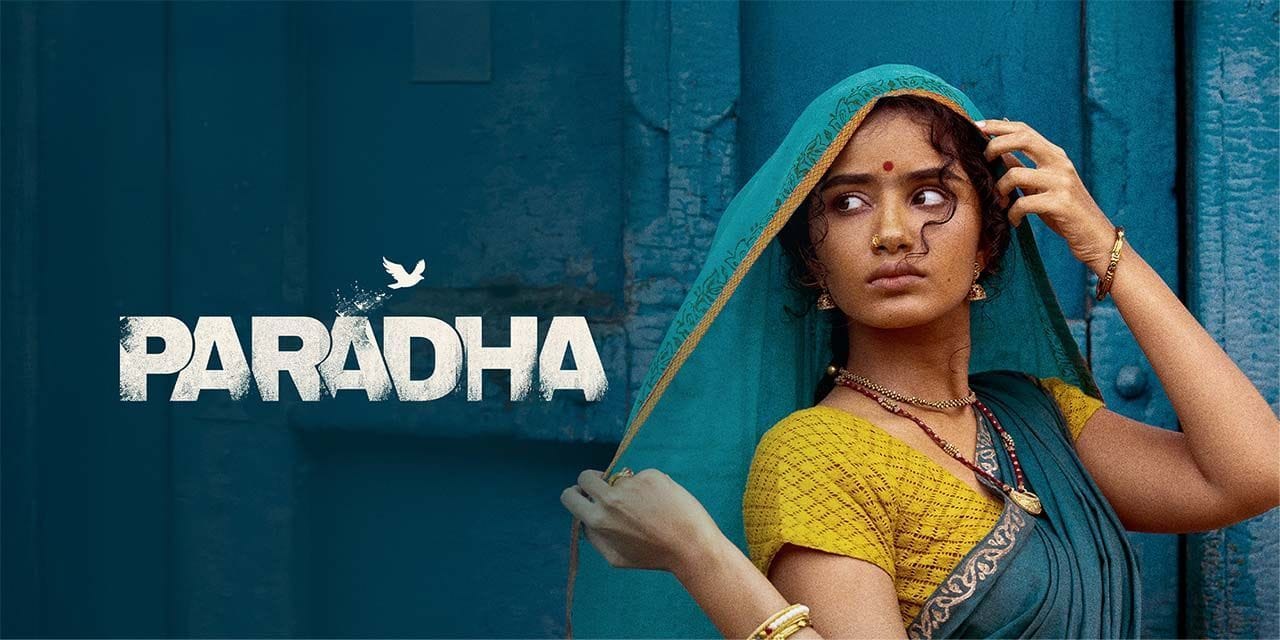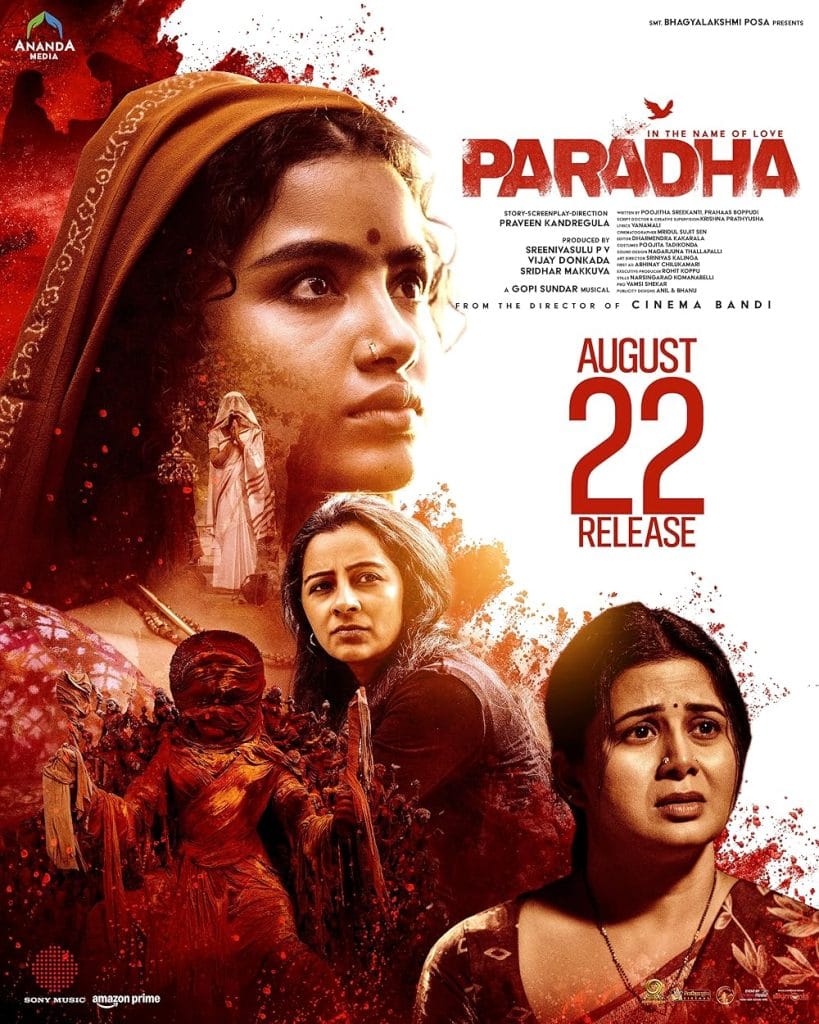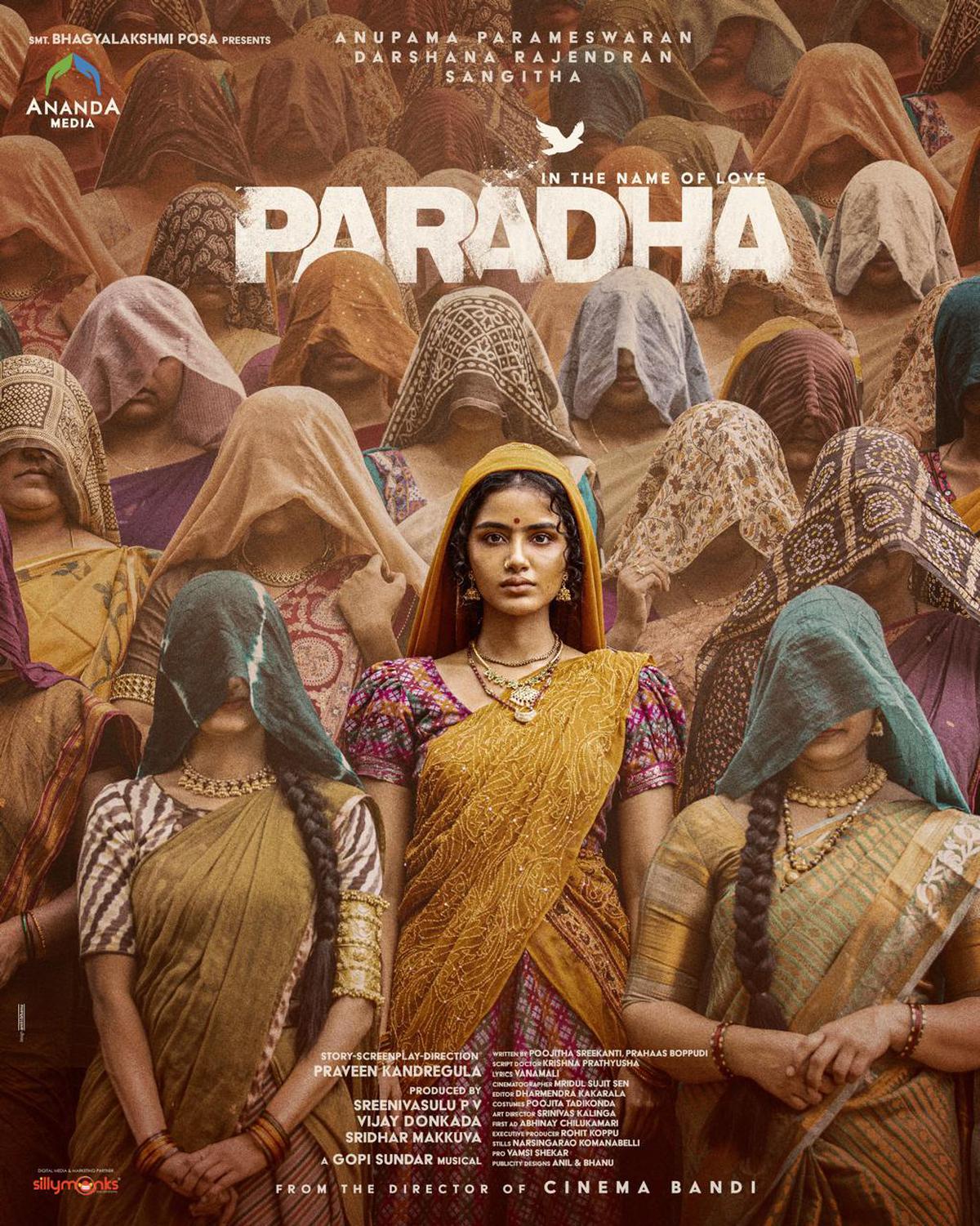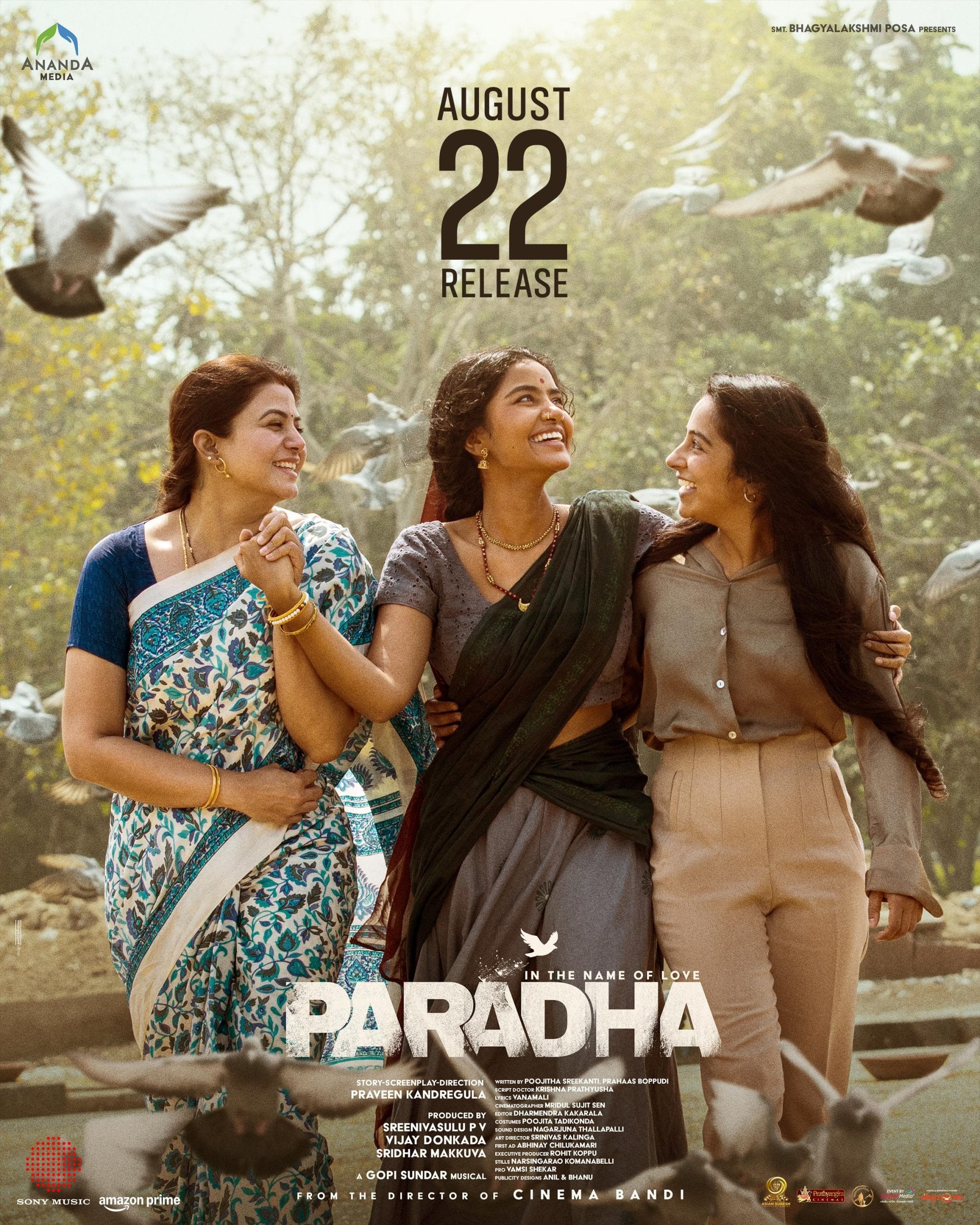Telugu cinema largely relies on marginal hypermasculinity, visibly spilling the rhetoric of machismo and male chauvinism. Rarely is there a central agency assigned to female characters who exist solely for the side plot. Yet, the Telugu film industry continues to maintain a ubiquitous presence in Andhra Pradesh and Telangana, where every aspect of social life is saturated with films and film stars. For an industry of this stature, bearing a notorious reputation for lacing its films with casteism and the invincible macho man image, Praveen Kandregula’s film Paradha is a refreshing breath of fresh air.
Dealing with the themes of gender sensitivity and superstitious blindness, Paradha offers a complex and nuanced portrayal of female agency and oppression as the protagonists embark on a life-changing journey that leads them out of the ignorance and ignominy that has guided their daily lives. Starring Anupama Parmeswaran, Darshana Rajendran, and Sangitha Krish, the film cocoons out of the shell of commercial visibility for an authentic and heartfelt narration of a story that deserves to be told.
Metaphorical constructs, identity, and the veil of patriarchy
In an endearing and warm tale of female friendship and reclamation of agency, Paradha is set up in the fictional village of Padathi, which is closely bound by religious superstition and decaying customs. “Paradha,” here, is more than a veil symbolising dignity and honour for tradition; it is a metaphor for the larger hyper-invisibilised practice of asserting control over women’s lives by subjugating their identities behind a piece of cloth.
The custom of compulsorily draping their heads with a purdah (veil) is tied to the folklore of Jwalamma, who was a terrific warrior taking men at war but died while pregnant, leaving behind a harbinger that a woman’s veil is the ultimate passport to protect her from the looming threats of the outside world. Defiance of the tradition, even involuntarily, is considered to be a bad omen, bringing destruction and wrath to the village, and those disobeying must fall to death in the village well.
The well, thereby, represents the loss of patriarchal control and vindication. Director Kandregula’s use of visual metaphors in his cinematic spectacle to expose the invisible hand of patriarchy in our routine lives corresponds to Kracauer’s assertion that ‘films, like still photography, are a realistic medium for recording the objective world around us, rendering it meaning.‘
Tracing the life of Subbu, whose photograph lands up on the cover of a magazine after being captured without a veil, the film follows her journey to Dharamshala, Himachal Pradesh, as she sets out on a quest to find the photographer and save her village as well as her dying wedding prospects. This journey is replete with unexpected challenges and surprises that create an unforgettable experience, worth remembering.
Weaving the issues of identity flux, womanhood, and the weight of superstition and meaningless rituals that weigh down heavily on women, Paradha is a heartwarming story with its heart at the right place.
Weaving the issues of identity flux, womanhood, and the weight of superstition and meaningless rituals that weigh down heavily on women, Paradha is a heartwarming story with its heart at the right place.
Female friendships and womanhood in Paradha
Reclamation of female agency is one of the primary themes that Paradha deals with. It does so with absolute precision and control, although, at times, the film seems to force delivery of a social message. Despite the narration being dull at some points, the film reimagines female friendships and gender equations. When a landslide on the way to Dharamshala brings the journey of three women from distinct backgrounds to a halt, the director prudently joins the dots, bringing them together.
The story’s premise rests on the intersectionality of experiences shared by the three women—Amishtha, played by Darshana, who is a driven working professional navigating workplace harassment; Rathna, played by Sangitha, who is a housewife seeking an identity and independence from her overreliant family; and Subbu, played by Anupama, who is trying to find her feet away from the defying burden of tradition.
Films have rarely resorted to showcasing friendships through a feminine lens, with the most celebrated ones featuring an ensemble male cast—the most popular example being that of Dil Chahta Hai. A road trip, three women, ambitions, and freedom—these terms seem like misplaced parts of a jigsaw puzzle most writers are hesitant to piece together due to audience receptivity and the dominant cinematic paradigm that shies away from empowering narrations.
The relationship shared by the three women is transformative and meditative—it is a getaway from the daily grind holding profound meaning that shapes their perspective. Director Kandregula doesn’t generalise their experiences or put the overcasting lens of plight to carry forward the story. Instead, he emphasises their individuality and the uniqueness of their dreams to bring out their inner essence and identity. The entire process of self-actualisation is an honest attempt at unraveling the layers of womanhood and the deeply comforting bonds of female friendships trivialised by the society.
Cultural specificity and third-world experiences
Chandra Talpade Mohanty, in her groundbreaking study on postcolonial feminism critiques the idea of ‘global sisterhood‘ by advancing how the experiences of women from different ethnic backgrounds vary, and so does their oppression as well as victimisation. Highlighting the significance of cultural differences and diversity, she deconstructs feminine representation to warn us against homogenisation of women’s oppression under different cultures.
The entire process of self-actualisation is an honest attempt at unraveling the layers of womanhood and the deeply comforting bonds of female friendships trivialised by the society.
Curiously, Paradha hops onto the narration of third-world experiences to underscore how cultural specificities influence social realities.From the ritualised control exercised on the women of Padathi through enforcement of a veil to the unwritten pressure unfairly placed on the shoulders of a housewife to the gendered struggle to gain a promotion, the world functions within a patriarchal framework. Why, then, is Subbu forced to prove that the slip of the veil was entirely accidental, a deviation from which would mean social rejection and death?
Rarely do we pay any attention to the universal tendencies of marginalisation, religious dogmas and cultural oppression that influence struggle leading to change.
Through its 144-minute runtime, Paradha does justice to the story through a brilliant cast, a decent narration, and a powerfully resonating theme. Social conditioning works in ways beyond the scope of human imagination. The tagline, ‘in the name of love,‘ for instance, is a reminder of the manipulative tactics used to enforce the normalisation of a veil. The small-town conditioning is revealed in the raw honesty, grit, and vulnerability shown in the protagonist’s eyes.
Despite its positives, Paradha has its own fault lines. At times, the narrative begins to feel sloppy, dragged, and even preachy. The orchestration of such a backward custom in contemporary Andhra Pradhesh is slightly unbelievable. Despite pronouncing its message loudly, the conviction with which the story is narrated is warm and comforting. The men in this world seek to inflict their archaic practices on the women of their houses.
Paradha has a much larger socio-cultural point to address that overshadows the apparent tokenism. It urges women to look beyond the constraints that pull them back and be real and unapologetic. In tearing down the veil, Paradha unveils the discomfort and silence around women-centric stories, foregrounding their experiences and agency.
About the author(s)
Nausheen is currently an undergraduate student pursuing journalism at Lady Shri Ram College for Women, Delhi University. With a keen interest in feminism, geopolitics, and social issues, her passions lie in research, writing, and public speaking. In her free time, she enjoys listening to music, sipping coffee, and playing chess.








